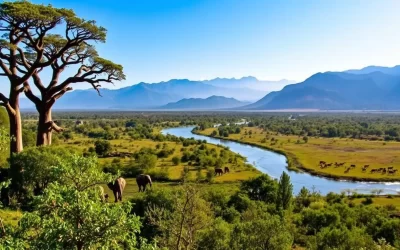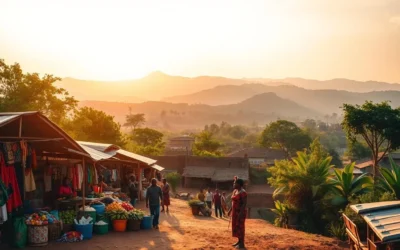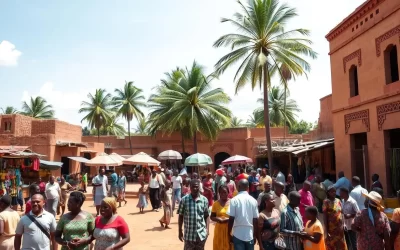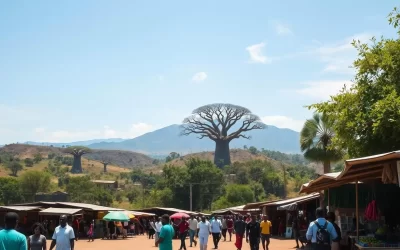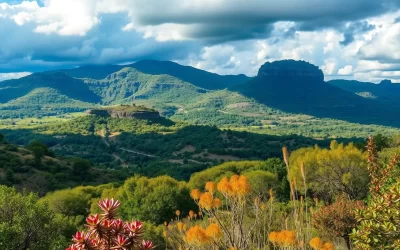Discover the vibrant cultural heart of northern Togo in Kara, a city that offers a unique blend of traditional customs and natural beauty. As the third-largest city in the region, Kara serves as an excellent base for exploring the fascinating northern area.
Travelers to Kara can experience authentic West African culture through interactions with local ethnic groups. The city and surrounding region boast numerous attractions, including UNESCO World Heritage Sites and vibrant local markets.
This comprehensive guide will walk you through the best experiences in Kara, providing practical travel information and insider tips to make your visit truly memorable.
Discovering Kara: The Cultural Heart of Northern Togo
As the cultural heart of Northern Togo, Kara beckons travelers with its rich heritage and warm hospitality. This vibrant city is a treasure trove of cultural experiences, offering a unique blend of traditional and modern attractions.
Where is Kara Located?
Kara is situated in the northern region of Togo, serving as the capital of the Kara Region. It is nestled in the valley of the Kara River, surrounded by scenic landscapes that are perfect for exploration.
Brief History of Kara
Kara has a rich history, deeply influenced by the Kabye people, one of Togo’s major ethnic groups. The city has evolved into a significant cultural hub, hosting various festivals and events that showcase its heritage. The Evala wrestling festival, a rite of passage for young Kabye men, is a major highlight, attracting visitors from around the globe.
Why Visit Kara?
Kara is a cultural destination that offers an authentic glimpse into traditional Togolese life. Visitors can experience the vibrant culture firsthand by attending the Evala wrestling festival, exploring the local markets, and interacting with the friendly locals. The city’s surroundings also provide numerous attractions, including the UNESCO World Heritage Site of Koutammakou.
| Cultural Attractions | Natural Attractions | Experiences |
|---|---|---|
| Evala Wrestling Festival | Kara River Valley | Traditional Togolese Cuisine |
| Koutammakou UNESCO Site | Scenic Countryside | Local Craft Workshops |
| Vibrant Markets | Hiking Trails | Cultural Homestays |

With its diverse ethnic groups, including the Kabye, Batammariba, and Kotokoli, Kara offers a rich tapestry of traditions, crafts, and cuisines. Unlike more touristy destinations, Kara provides travelers with genuine cultural experiences and interactions with locals, making it a unique destination in West Africa.
Best Time to Visit Kara, Togo
Planning a trip to Kara, Togo, requires understanding the best time to visit this culturally rich city. The timing of your visit can significantly impact your experience, with different seasons offering unique opportunities to engage with local culture and traditions.
Dry Season: November to March
The dry season, spanning from November to March, is considered an ideal time to visit Kara. During this period, the weather is generally pleasant, making it perfect for outdoor activities and exploration of the city’s cultural heritage. The dry season also coincides with several cultural events, such as the Evala wrestling festival, offering visitors a chance to experience local traditions and festivities.
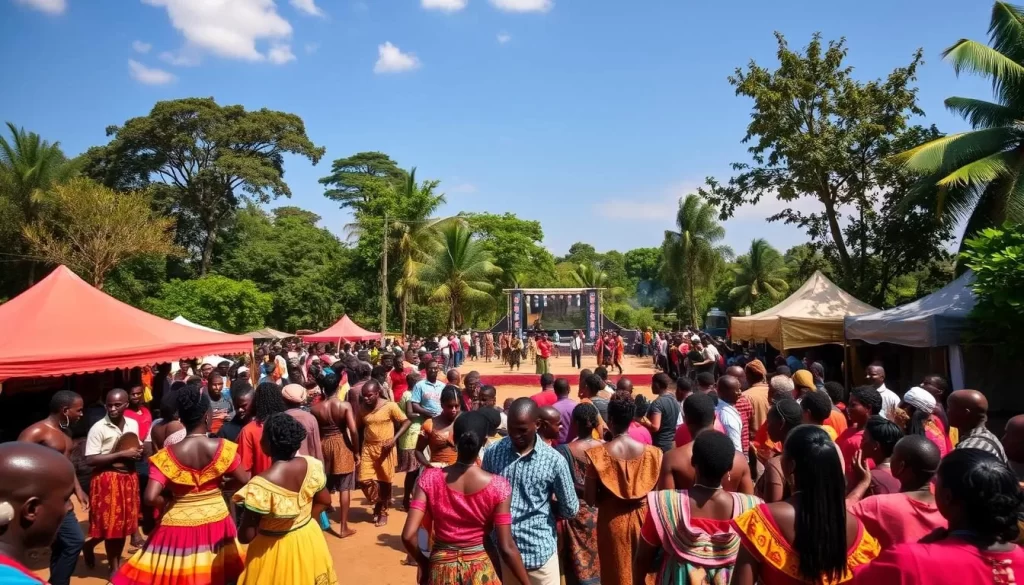
Cultural Festivals and Events
Kara is renowned for its vibrant cultural festivals, which are an integral part of the city’s identity. The Evala wrestling festival, typically held in July, is a significant cultural event that showcases traditional wrestling matches, dancing, and drumming. Beyond Evala, other cultural highlights include the Kondona festival celebrated by the Losso people, featuring rhythmic dancing and traditional songs. Visitors can also witness traditional music performances and displays of traditional crafts during these events, immersing themselves in the local culture and traditions.
- Experience the Evala wrestling festival, a significant rite of passage for young Kabye men.
- Enjoy traditional dancing, drumming, and colorful ceremonies.
- Participate in seasonal harvest festivals throughout the year.
- Witness traditional music performances featuring unique instruments.
By planning your visit around these cultural festivals, you can enhance your experience of Kara and participate in centuries-old traditions and community celebrations, making your trip truly memorable.
How to Get to Kara
Getting to Kara, Togo, is the first step in exploring the cultural heart of Northern Togo. As you plan your travel to this vibrant city, you’ll find several options to suit your needs.
From Lomé and Other Major Cities
To reach Kara from Lomé, the capital city of Togo, you have a few options. You can take a domestic flight, though this is less common, or more typically, travel by road. The journey by car or bus from Lomé to Kara takes around 4 to 5 hours, depending on traffic and road conditions. For those coming from other major cities or neighboring countries, road travel is also a viable option, with various bus services and private car hires available.
Transportation Options Within Kara
Once you arrive in Kara, navigating the area is relatively straightforward. For short distances, moto-taxis, known locally as “zemidjans,” are the most common and affordable mode of transport, with fares ranging from 200-500 CFA ($0.35-$0.90). For a more leisurely exploration of the city and its activities, walking is a good option in the central areas where many attractions are concentrated.
| Mode of Transport | Cost | Best For |
|---|---|---|
| Moto-taxis | 200-500 CFA ($0.35-$0.90) | Short distances within the city |
| Walking | Free | Exploring central areas |
| Car with Driver | 30,000-50,000 CFA ($50-$85) per day | Day trips to surrounding areas |

Top 10 Best Things to Do in Kara, Togo
From cultural landmarks to natural wonders, Kara has something for every kind of traveler. As you explore this vibrant city, you’ll discover a rich tapestry of traditions, history, and natural beauty.
Visit Koutammakou UNESCO World Heritage Site
The Koutammakou UNESCO World Heritage Site is a must-visit attraction in Kara, showcasing the unique cultural heritage of the Batammariba people. This site features traditional mud tower houses that are a testament to the region’s architectural ingenuity.
Explore the Kara Market
The Kara Market is a bustling hub of activity where you can experience the local culture firsthand. Browse through stalls selling everything from fresh produce to handicrafts, and enjoy the vibrant atmosphere of this place to connect with the locals.
Experience the Evala Wrestling Festival
The Evala Wrestling Festival is a unique cultural event that showcases the traditional wrestling practices of the Kabye people. This festival is an exhilarating experience that gives you a glimpse into the region’s rich cultural heritage, making you feel at home among the enthusiastic crowd.
Tour the Kara Grand Mosque
The Kara Grand Mosque is an impressive architectural landmark that reflects the city’s religious diversity. Take a guided tour to learn about its history and significance.
Day Trip to Lake Togo
A day trip to Lake Togo offers a chance to relax and enjoy the natural beauty surrounding Kara. You can enjoy water activities, take a boat ride, or simply soak in the serene atmosphere.
Hike Mount Agou
For adventure seekers, hiking Mount Agou is a great way to experience the natural beauty of the region. The hike offers stunning views and a chance to explore the local flora and fauna.
Visit the Centre d’Art et de Culture
The Centre d’Art et de Culture is a cultural hub that showcases contemporary and traditional Togolese arts. You can explore exhibitions, attend performances, and participate in workshops to gain a deeper understanding of the local culture.
The center features rotating exhibitions, performances, and workshops that highlight the best of Togolese art and culture. You can enjoy:
- Gallery spaces displaying works by local artists
- Regular performances of music, dance, and theater
- Educational programs and workshops on traditional crafts
- Cultural events bringing together diverse ethnic groups
- A gift shop offering ethically sourced handicrafts
Cultural Experiences in Kara
Kara, with its vibrant cultural scene, provides an opportunity to experience the authentic life of Northern Togo. The region is home to diverse ethnic groups, each with their unique traditions and customs.
Meet the Batammariba People
The Batammariba people are one of the prominent ethnic groups in the Kara region. You have the chance to learn about their fascinating culture by visiting their villages and participating in their daily activities. Their traditional practices and way of life offer a glimpse into the rich cultural heritage of the area.
Traditional Crafts and Artisans
Kara is renowned for its skilled artisans who specialize in traditional crafts such as woodcarving, pottery, and weaving. You can experience the local craftsmanship by visiting workshops and markets where these artisans showcase their work. The intricate designs and patterns reflect the cultural identity of the region.
Local Cuisine to Try
The local cuisine in Kara is a reflection of its cultural diversity. You can try traditional dishes such as “Fufu” made from yams or cassava, “Akume” or corn dough, and “Grilled Agouti,” a popular bush meat. Vegetarians can enjoy “Gboma Dessi,” a spinach stew made with eggplant and other vegetables. Some key aspects of Kara’s cuisine include:
- Dishes made from local ingredients such as yams, cassava, and corn.
- Traditional cooking techniques that have been passed down through generations.
- A variety of protein sources including freshwater fish, chicken, and bush meats.
- Vegetable dishes featuring locally grown ingredients like eggplant and okra.

Practical Travel Tips for Visiting Kara
As you prepare for your adventure in Kara, Togo, here are some practical travel tips to keep in mind. To ensure a smooth and enjoyable journey, it’s crucial to be aware of the local customs, health guidelines, and safety precautions.
Accommodation Options
Kara offers a range of accommodations to suit different budgets. You can choose from luxury hotels that provide comfort and modern amenities to more budget-friendly guesthouses that offer a local experience. Booking in advance is recommended, especially during peak travel seasons.
Language and Communication
While French is the official language, local languages such as Kabye are widely spoken. Learning a few basic phrases in the local language can enhance your interaction with the community. Many locals, particularly in the service industry, speak some English, but it’s still beneficial to have a translation guide or app handy.
Safety and Health Considerations
Kara is generally considered safe for tourists, but standard precautions should be taken. Here are some key health and safety tips:
- Consult a travel medicine specialist before your trip to get the necessary vaccinations, such as yellow fever, typhoid, and hepatitis A.
- Take malaria prophylaxis and use insect repellent with DEET to prevent mosquito-borne diseases.
- Drink bottled or properly treated water and be cautious with ice and uncooked foods.
- Stay hydrated and use sun protection to avoid heat-related issues.
- Avoid political demonstrations and refrain from photographing government buildings without permission.
| Health Precaution | Description | Recommendation |
|---|---|---|
| Malaria Prevention | Malaria is a risk in Togo | Take prophylactic medication and use DEET |
| Vaccinations | Required for yellow fever, typhoid, and hepatitis A | Consult a travel medicine specialist |
| Water Safety | Tap water is not safe to drink | Drink bottled or treated water |
By being informed and prepared, you can have a safe and enjoyable travel guide experience in Kara, engaging in various activities and taking advantage of the chance to explore this unique cultural hub.
Conclusion: Why Kara Should Be on Your West African Itinerary
With its rich cultural heritage and breathtaking natural beauty, Kara is an ideal addition to any West African itinerary. The region offers travelers an authentic window into West African culture without the crowds and commercialization found in more popular tourist destinations.
You can explore the UNESCO World Heritage Site of Koutammakou, experience the Evala wrestling festival, and visit Lake Togo, all within a short day trip. The best time to visit Kara is during the dry season (November to March), ensuring comfortable conditions for various activities. By including Kara in your travel plans, you’ll gain insights into traditional lifeways and the enduring cultural heritage of this fascinating region.
The above is subject to change.
Check back often to TRAVEL.COM for the latest travel tips and deals.

